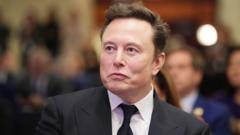In a dramatic move ahead of Wisconsin's Supreme Court election, billionaire entrepreneur Elon Musk distributed $1 million cheques to voters, igniting a legal battle over the implications of such a giveaway. The controversial gesture comes as the state prepares for a contentious election on Tuesday, which could reshape the court's ideological balance. Wisconsin's Attorney General, Democrat Josh Kaul, had filed a lawsuit attempting to halt Musk's cash distribution, arguing it violated state laws against vote-buying. Kaul's stance reflects a broader concern regarding the integrity of electoral processes, especially considering the election's significance as the most expensive judicial race in U.S. history.
Despite this opposition, Musk delivered the first two cheques at a rally on Sunday, emphasizing a call for impartiality from judges. Musk's legal team defended the initiative, arguing it was a promotion of free speech and grassroots activism rather than an attempt to sway votes. They cited the First Amendment, while Kaul accused Musk of illegally incentivizing votes and undermining the electoral process.
The election is poised to shift the court's control from a liberal to a conservative majority, potentially affecting critical issues like abortion rights and redistricting in upcoming years. Musk and former President Donald Trump have endorsed Judge Brad Schimel, who is vying against Dane County Judge Susan Crawford, endorsed by liberal justices. Despite Musk's financial backing for Schimel's campaign, the judge distanced himself from the tech mogul, stating he was unaware of Musk's rally plans. This controversy echoes previous instances where Musk engaged in similar voter incentives, suggesting a trend that continues to challenge legal norms surrounding electoral fairness.
Despite this opposition, Musk delivered the first two cheques at a rally on Sunday, emphasizing a call for impartiality from judges. Musk's legal team defended the initiative, arguing it was a promotion of free speech and grassroots activism rather than an attempt to sway votes. They cited the First Amendment, while Kaul accused Musk of illegally incentivizing votes and undermining the electoral process.
The election is poised to shift the court's control from a liberal to a conservative majority, potentially affecting critical issues like abortion rights and redistricting in upcoming years. Musk and former President Donald Trump have endorsed Judge Brad Schimel, who is vying against Dane County Judge Susan Crawford, endorsed by liberal justices. Despite Musk's financial backing for Schimel's campaign, the judge distanced himself from the tech mogul, stating he was unaware of Musk's rally plans. This controversy echoes previous instances where Musk engaged in similar voter incentives, suggesting a trend that continues to challenge legal norms surrounding electoral fairness.



















